Is Jesus Really THE Truth?
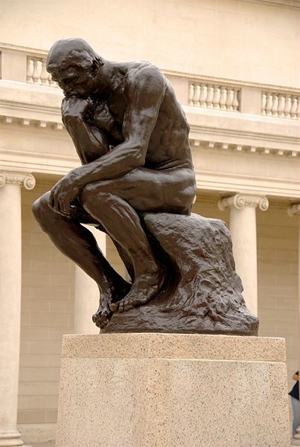 I am the way, the truth, and the life. No one comes to the Father except through Me.
I am the way, the truth, and the life. No one comes to the Father except through Me.
–Jesus
That statement is one of the most controversial and hated statements that Jesus ever made. This quote, and other statements in the Bible lead followers of Jesus to conclude that He is the ONLY way to know God. His Truth is the ONLY Truth. His Life is the ONLY way to live.
In a day when many people believe that truth cannot even be known in the first place, how can followers of Jesus suggest that they are right and others are wrong? Can they really claim that the Bible contains the Truth that will lead to eternal life with God?
There are three criteria that philosophers use to determine the trustworthiness of a statement or proposition. Since Jesus’ words are recorded in the Bible, it’s important to apply these criteria generally to the book as a whole and then return specifically to the statement Jesus made.
The Correspondence Theory of Truth
The Correspondence Theory of truth asks if a statement (or statements) corresponds to external reality. The Bible passes this first test. The Bible is externally consistent. In other words, there are no existing external realities that contradict any of the Bible’s claims – not one!
For example, for hundreds of years people couldn’t understand how Abraham was from Ur of the Chaldees in ancient times. Apparently, a town called Ur had been found that didn’t correspond to where the Bible seemed to indicate it should be. No problem, wait a couple of hundred years and someone dug up another town known as Ur of the Chaldees that was precisely where the Bible said it would be.
Or what about science. Sure, people got upset with the whole Galileo/Copernicus fiasco. Some had falsely interpreted the Bible and thought the earth was the center of the universe. Science seemed to be saying that the sun was at the center of our galaxy. How would you interpret, “From the rising of the sun, to the going down of the same, the name of the Lord shall be praised.”? Have you ever talked about the sun rising or setting? If you are living in the Dark Ages you might be tempted to think that the sun revolves around the earth, but when you know the truth you see that this verse is written from the author’s perspective and not from a scientific background. Today, we use the same language (does the sun really “set”?) but we know the sun isn’t the one rising or setting, we are the ones revolving around the sun.
The first example from archaeology shows how the Bible has proved accurate through the test of time and supposed inconsistencies have been explained by new discoveries. The second example from astronomy shows how science, archaeology, or history can make our interpretation of Scripture better, but doesn’t contradict anything that has been written. The author wasn’t teaching us a doctrine of geocentricity, he was talking about the worth and glory of God. Again, there is nothing in the Bible that does not correspond to external, tangible reality. Books have been written about the “discoveries” made by the Bible hundreds and thousands of years before geology or astronomy or archaeology got around to officially uncovering them.
The Coherence Theory of Truth
The Coherence Theory of truth asks if the statements being made are internally consistent.
The Bible is a collection of people’s glimpses of God through the ages. It is a compilation of 66 books written by about 40 authors who lived on 3 different continents over a span of about 1600 years using dozens of different literary forms. Somebody is bound to write something that contradicts someone else, right?
However, the Bible passes the coherence theory test. It is breathtakingly consistent internally. Outside of the Bible, I don’t know of TWO people writing in the SAME generation who display the same amount of internal consistency! For example, there’s no debate – by ANY scholar that I’m aware of – that the Old Testament predates the New Testament. Sometimes the books in the OT are over a thousand years older than the NT documents. Yet, the OT contains hundreds of prophecies. If just one of those prophecies proved to be untrue, the reliability of the entire document would be forfeit. Instead, we find that many of those prophecies have been fulfilled and all of them are precise in every way to actual events that happened hundreds of years later. On top of that, the overall theology of the Bible is internally consistent.
As we interpret the Bible, we sometimes disagree with others about various points of doctrine but that’s our fault not the Bible. We look at the Bible with cultural, social, and philosophical lenses that color what’s actually there. Again, our modern mistakes don’t disprove the Bible, it just drives us to be more careful with our interpretation and application of what we’ve been given. Which leads us to the final criteria for determining truth.
The Pragmatic Theory of Truth
Finally, there is the Pragmatic Theory of truth. This theory asks if a certain belief or set of beliefs really work. If you apply the truth to your life will it work for you? Again, the Bible passes the test. Incidentally, it could be argued that the world religions pass this test. People seem to be fulfilled in life when they pray to Mecca or help someone in need. Their religious deeds seem to make them happy.
Of course, followers of Jesus know from personal experience that the Bible passes the test because they are living it. We haven’t just taken it out for a test drive, we’ve invested our lives into owning it and driving it to work and to school and to social gatherings. The Bible is the only sacred writing that passes all three tests and it has been proven over and over again. The message of the Bible corresponds with external reality, it’s message is internally coherent and consistent, and it’s practical application brings contentment and joy to the one who trusts that message.
What about Jesus’ Words?
So that brings us back to what Jesus said. We can apply all three of these tests to the Bible generally but we can also apply it specifically to Jesus. Jesus’ path, message, and victory over death are all internally consistent with the broader theme of the Bible. His way, truth, and life all correspond with reality. Those of us who follow His way, heed His truth, and enjoy the abundant life He offers to everyone, recognize the practical implications of doing so: We now have a relationship with the God who caused the earth to revolve around the sun, who spoke to prophets hundreds of years in advance and told them His Son would be born in Bethlehem, and who has given us meaning and purpose and direction in life and has forgiven us for all the times we rejected Him, blasphemed Him, or ignored Him.
It’s ironic that some of the best news that could be heard is often misconstrued as bad news. Jesus didn’t say, “I am the way, the truth, and the life. No one comes to the Father except through Me” to stick it in your eye. Instead, Jesus is telling us exactly how we can know God and glorify Him and enjoy Him forever. He came in the flesh to prove God’s love for His creation. Jesus isn’t blocking people from knowing God, He’s showing them how they can. He endured torture, shame, and death so that all who believe in Him could know God and enjoy Him forever.
Related Posts: Paths to God :: One God, Two Gods, Three Gods, No God :: Subscribe
Are People Generally Good or Basically Bad?
Michael Wittmer has asked some great questions in his book Don’t Stop Believing: Why Living Like Jesus is Not Enough. I’ve been reviewing this book chapter by chapter because the book closely identifies with the content of ChurchETHOS. I’ve been able to give away 5 copies of the book already and you can still get one for free here. So far, Wittmer has asked, Must You Believe Something to be Saved? and Do Right Beliefs Get in the Way of Good Works? In my posts I’ve tried to be fair to Wittmer’s thoughts and I’ve sprinkled the posts with some of my own responses to those questions as well. There have been some great comments so I hope you will go back and check out the conversation.
The Next Question
Today, I want to talk about chapter four of DSB. Wittmer asks, “Are people generally good or basically bad?”
The problem with this question is that we want to believe in the innate goodness of people. Since we want to believe it, we often do and we tend to ignore the more important question of what God thinks about our goodness. This becomes a Big Assumption that holds us and keeps us from recognizing the truth that we are in desperate need of being rescued from ourselves (I don’t care how good you think you are).
There is certainly some goodness in our lives, but there is also some badness. In comparison to Bin Laden I’m a saint. In comparison to Mother Theresa I’m a sinner. But in comparison to God?
Universally Created By God to Enjoy Him Forever
The first question and answer of the Westminster Catechism is:
Q. What is the chief end of man?
A. Man’s chief end is to glorify God, and to enjoy him forever.
There is something that all of us have in common: we were all created by God to glorify and enjoy Him forever. We were created in His image. Our first parents were placed in a beautiful garden. God looked at all that He had made and it was very good. Our common – and very human – love for life, for beauty, for creation, and for our fellow human are part of what it means to be human. Nothing we’ve ever done can remove those sorts of qualities (and others) from our human nature. I’m confident that I can find something good in ANYONE if I spent enough time looking.
Humans do good things. We write checks to charity. We help old ladies cross streets. We generally try and care for the defenseless, the helpless, the hopeless. People are generally capable of doing good.
Universal Rejection of God
We humans have all been created, therefore we are generally good, but we all have something else in common too. Wittmer writes, “Everyone possesses a relative goodness that enables us to help others. But when we lift our eyes above our natural level and compare our goodness with God, we confront a double problem: God’s higher standard and our sinful brokenness.” We were all created, but we also have ALL rejected God, something the Bible calls sin. Some do it willfully, some do it ignorantly, but the fact remains, we’ve all done it.
For those of us who have turned back to God and asked His forgiveness, we must realize that we are no better than anyone else. Wittmer encourages Christian humility and I strongly agree. Just because I’m forgiven and someone else isn’t doesn’t mean that that same grace and love and forgiveness isn’t extended to them by God too. God loves those He has created. He created all of us and He wants us to enjoy Him forever. He extends His grace to ALL who will receive it. He longs for us to be reconciled to Him.
The Fall is what happened when Adam and Eve disobeyed God. Ever since then, humanity is living under a curse. Sure, we can do some good things every once-in-a-while, but we can also do some bad things. Some have more discipline than others and though they don’t know God they are able to listen more attentively to their God-given conscience and they restrain themselves from doing too much evil. But we all do it. We all have hurt someone. We’ve all let someone down. This world may be a better place thanks to you, but just barely. A lot of people feel like they’ve got to do more good to offset the bad that they’ve done. That’s noble and is advisable, but God is more concerned with your relationship with Him. You can make a bigger difference in the world if you obey Him.
Even though “obedience” doesn’t sound good what is God asking us to obey? Jesus summed it up into “Love the Lord your God with all your heart, soul, mind, and strength…and love your neighbor as yourself.” (Luke 10:27) If you could do that perfectly, then you would truly be good with no shred of evil in you. Jesus is the only one capable of that kind of obedience. When we confess our disobedience to God and ask His forgiveness, He begins the process of healing us from the evil that permeates our nature. He begins to show us how to be good again.
So What Is Good?
A lot of people don’t want us to bring up sin and the Fall. They want us to simply celebrate the good that we find in others and accept the bad that sometimes happens. This weakens the need for forgiveness and lets us just live our lives however we deem best (and that’s often not as good as we think). That kind of goodness will never measure up.
Wittmer gives a good example of this:
Yesterday my six-year-old pounded out his first recognizable tune on the piano, and I made quite a fuss about it. “Landon, that is ‘Mary Had a Little Lamb’! You are playing the piano! Good Job!” And it was – especially good for a beginner and far better than anything I can play. But compared to my wife or a concert pianist, it was not very good at all. Goodness is a relative term. It depends on what we are talking about.
Again, when we talk about good things people do, I think we can all agree that we are generally good, but in comparison with the God who created us, we all fall short. There is a chasm that we ourselves have dug with our sin that separates us from God, not because of God, but because of us! That’s not good.
 Wittmer quotes Tony Jones, another “postmodern innovator” who said, “a common metaphor showed God on one side of a diagram and a stick figure (you) on the other; the chasm between was labeled ‘Sin,’ and the only bridge across was in the shape of Jesus’ cross. But emergents ask, ‘What kind of God can’t reach across a chasm? Chasms can’t stop God!'” Wittmer replies brilliantly to this naive comment: “I am not sure what Jones is objecting to here, for the metaphor’s point is that while the chasm prevents us from coming to God, it does not stop God from reaching across. Perhaps he means that God should be able to reach us in some other way besides the cross? Or perhaps that our sin does not separate us from God?”
Wittmer quotes Tony Jones, another “postmodern innovator” who said, “a common metaphor showed God on one side of a diagram and a stick figure (you) on the other; the chasm between was labeled ‘Sin,’ and the only bridge across was in the shape of Jesus’ cross. But emergents ask, ‘What kind of God can’t reach across a chasm? Chasms can’t stop God!'” Wittmer replies brilliantly to this naive comment: “I am not sure what Jones is objecting to here, for the metaphor’s point is that while the chasm prevents us from coming to God, it does not stop God from reaching across. Perhaps he means that God should be able to reach us in some other way besides the cross? Or perhaps that our sin does not separate us from God?”
For those of us who believe the truth of the Bible, we can already see how God has reached across the chasm. Hey, I don’t like simplistic, cartoon versions of the gospel either but the basic truth is that we ARE sinful and we ARE separated from God. Thanks be to God that He HAS reached across the chasm to reconcile us to Himself!
Is Our Good, Good Enough?
We have to realize that we may do some good things but when it comes to loving God with all our heart, soul, mind, and strength and loving our neighbor as ourselves, we just aren’t cutting it. We are in need of an overhaul of our sinful system and God lovingly provides the answer through His Son Jesus. Our good may help a person in need, or bring a smile to someone’s face, but our eternal relationship with God depends on our willingness to give up and confess that we can’t do it without His help.
Wittmer writes, “People are created, and so we may unreservedly love them. People are fallen, and so there is a difference between those who are running their own lives and those who are striving to follow Jesus. Our common creation enables Christians and non-Christians to cooperate, and our response to the Fall explains why we often compete.” Let’s learn how to love each other God’s way. He is the only One who is ultimately Good. We need to be restored to Him and that relationship with Him will help us love others and enjoy Him forever.
One God, Two Gods, Three Gods, No God
Is it reasonable to believe in god? If there is a god, how do we go about getting to know him / her / them? Has science ruled out the possibility that god exists?
These are a few of the questions that people who are seeking tend to ask. I’ve had this conversation on several occasions with people who are trying to figure out the answers. I’ve come to realize that when someone is seriously asking these questions it is helpful to remove some obstacles so they are free to explore all the possibilities.
The Ignorance of Tolerance
 The first obstacle to people believing in god is the concept of tolerance. I understand where tolerance comes from. Tolerance comes from a sincere desire to keep religions from fighting with one another. The ideal of tolerance is that some people worship god one way, others worship god another way, and it’s okay for them to do that [just don’t be pushy with your beliefs, thank you very much]. The sentiment of a tolerant person is “can’t we all just get along?” — I can appreciate that.
The first obstacle to people believing in god is the concept of tolerance. I understand where tolerance comes from. Tolerance comes from a sincere desire to keep religions from fighting with one another. The ideal of tolerance is that some people worship god one way, others worship god another way, and it’s okay for them to do that [just don’t be pushy with your beliefs, thank you very much]. The sentiment of a tolerant person is “can’t we all just get along?” — I can appreciate that.
But tolerance is ignorance…
or stupidity (depending on your frame of mind)
Most people simply go along with tolerance as an ideal because it is the foundation of our society (when it comes to various religions). They believe that all religions are equally right and/or wrong so there’s no need to force feed your beliefs on me (ignorance). Others know the shaky logic of tolerance yet remain steadfast and immovable (stupidity).
This needs to change.
Call A Doctor, I’m Feeling Polytheistic!
To help remove the obstacle of tolerance so that we can take another step towards authentic worship of god, we have to talk about the various religions of the world.
Tolerance is built on the foundation that all religions are true. Really? Can any thinking person see the problem with that assertion?
We have to realize that any statement made about god is either true or false – not both. All major religions make one of three basic statements about god: either there is NO god, there is ONE god, or there are MORE THAN ONE gods. When we say that all religions are true and that we should tolerate all viewpoints we are asking people to tolerate lies. Only one option can be correct. God’s existence and being are not dependent upon what I believe about god! God IS and we must either accept him as he IS, or flat out reject him by worshiping a false god of our own imagination.
So, when we survey the major religions of the world we discover several atheistic (no god) religions, several monotheistic (one god) religions, and several polytheistic (many gods) religions. If, for the sake of argument, each of these beliefs had one-third of the world’s population as adherents to their religions, then two-thirds of the world would be wrong! They are wasting their time! (At this point I’m not trying to make a case that my world-view is correct, just saying is all) Their life is being lived in pursuit of a lie! They think they are being sincere, but they are sincerely wrong!
The Truth Shall Set You Free!
But how do we go about discovering which one is true?
Each -theism has it’s own share of problems in establishing it’s validity. Like atheism: Hasn’t science proven that this is the most rational option? Not if god is spiritual and not material. Science has no tools to measure or observe or test the nature of god. I have a feeling that it never will.
What about monotheism and polytheism? If we say god or the gods can’t be observed isn’t that just a cop out? How can we prove there is a god or more than one gods if we can’t use our senses to find out more about him / her / them?
And by the way, do you think it’s remotely possible or even likely that god might have something to say about the matter? Does he know the truth? Has he ever offered humanity a clue as to who he might be? Or how we might know him? Or what his plan is for the universe (much less for little old me)?
The Audacity of Veracity
That’s where our search can begin: with the sacred documents of various religions. Either god exists or He doesn’t, right? If god doesn’t exist then there would not be any sacred documents describing the plan of god, the nature of god, etc. The sacred documents that we do have are simply fantastical human concoctions and to some degree they all share or plagiarize material from one another. All of them are wrong because there is no god.
But, if there are many gods then there could be many sacred documents (which there are). All of them could be true. When the Christian or the Jewish god says, “You shall have no other gods other than Me!” then you could say, well, he’s just upset with the other gods and wants all the power and glory for himself, but he’s only one of many gods. That’s a plausible theory and it actually accounts better for all the sacred documents than atheism. Wherever we are led astray comes from the gods themselves. Maybe one is lying to us by saying he’s the only god.
On the other hand, what if only one document has the Answer everyone is looking for. In that case, only the sacred document from that religion is Truth, all the others are forgeries penned by a man or woman with various motivations for doing so.
It seems to me that we need to search these documents and apply the veracity test to each of them. One could start with the predominant religions in each category. Study the sacred writings of Buddhism (atheistic religion), Hinduism (polytheistic religion), and Christianity (monotheistic religion) and simply see if anything stands out. This would be a good starting place.
Coming to Terms with Reality
One prominent atheist was confronted with all the religions of the world (including atheism) and finally had to conclude that god exists. He felt like all religions were either deep (spiritual and mysterious and only accessible by mystics, gurus and priests) or wide (easy to understand and accessible by the masses). He came to realize that only two religions were both deep and wide: Hinduism and Christianity. Since he had already come to realize that atheism is a lie, he decided to explore these two religions. In the end, after reading the Gospels in the Bible, he couldn’t escape the veracity of the story of Jesus. He couldn’t believe that a human could’ve come up with this on his or her own.
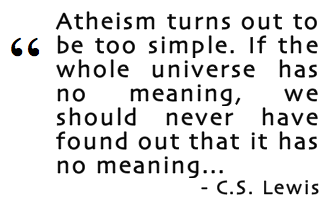 Though it was perhaps embarrassing for an established professor of literature at prestigious Oxford to admit he was wrong, C.S. Lewis became a Christian. It was the life of Jesus that made the difference. It made sense to Him. He said, “I believe in Christianity as I believe the sun has risen, not because I see it, but because by it I see everything else.” His eyes were opened and he was able to see God (notice the use of the capital G). Jesus exudes credibility. The Bible is reliable. God has revealed Himself and He is One God.
Though it was perhaps embarrassing for an established professor of literature at prestigious Oxford to admit he was wrong, C.S. Lewis became a Christian. It was the life of Jesus that made the difference. It made sense to Him. He said, “I believe in Christianity as I believe the sun has risen, not because I see it, but because by it I see everything else.” His eyes were opened and he was able to see God (notice the use of the capital G). Jesus exudes credibility. The Bible is reliable. God has revealed Himself and He is One God.
Personally, I see the universe around me and I see patterns, I see unity, I see evidence of one God. The person of Christ is unique, the Trinity is unique, the concept of Christianity is unique. It’s simple but it’s mysterious all at the same time. This isn’t proof, it’s just my personal experience of the Truth. I don’t have to prove anything to myself because I already know God. I won’t try to prove anything to you because you may be ignoring God or running from God. I’ll let you decide whether or not knowing God is in your best interests. My hope is that after reading this your curiosity will be piqued and you will have a desire to find out for yourself.
But please, please don’t say you are being tolerant by believing there can be both no god, one god, or many gods all at the same time. If you’ve read this all the way to the end then there is no room for ignorance on this matter any longer. Ignorance is simply not knowing the truth, and that’s fine, some people haven’t thought through the contradiction of tolerance. Foolishness is knowing the truth and rejecting it for selfish reasons. Ignorance is excusable, stupidity is not. After reading this post, ignorance is the only option not available to you anymore. Wisdom puts you on the path to finding God. Foolishness puts you on the path to finding nothing. If you are an atheist, you’ve already found nothing because that’s what you want to find. But for people willing to think, these are the two options before you: wisdom or foolishness.
PostScript
I share this post with you because I love you and God loves you. Truth can hurt sometimes and I don’t share the Truth with you because I’m gloating or angry. I sincerely want people to know God. God wants you to know Him. He’s given you a beautiful creation to enjoy. He’s given you His Word, the Bible, to understand Him. He offers you His love and, though we’ve all rejected Him and could even be considered as His enemies, He still wants to know you. I can understand if this post is offensive and I know you’re desire will be to bang out a hasty response in the comments section. That’s fine, as long as it doesn’t have offensive language, I will publish it. Feel free to ask questions, offer a contrary opinion, or debate my points. Just remember, I want to have a friendly, productive dialogue with my readers. Let this be a space you can use to explore the things I’ve articulated. God said, “When pride comes, disgrace follows, but with humility comes wisdom.” (Proverbs 11:2)
Related Post: Did Jesus Claim to be God? :: Subscribe ::
Missiological Thoughts for January 6th
I am currently attending a two week course at Gordon Conwell Theological Seminary on the subject of World Missions. This winter session is the start of my final year of seminary and this particular class ensures that it will be a good year. Yesterday I simply shared some of my notes from Day One and thought I would share, not necessarily the outline, but maybe some insights from Day Two. Hopefully, I will keep doing this for the next two weeks (with a few unrelated posts besides). As always, I invite conversation in the comments section because this is helpful to you and me as we think through these issues together.
The Great Commission
Today, Dr. Tennent spent the entire 3 hours discussing the Great Commission. There were a few things that were familiar and a few things that were brand new to me. The outline was quite simple. He went through each of the gospels and ennumerated all of the references to Jesus’ mission to the Gentiles. This culminated into the Great Commission passages from Matthew 28, Mark 16, Luke 24 (and Acts 1:8), and John 20.
The Usual (but still good) Insights
1. The Matthean Commission
The command in Matthew 28:19 is not “Go” as most people seem to think, it is “make disciples”. I’ve personally been saying this for quite some time and wish more people got it. My professor talked about the imperatival use of the verb “make disciples” whereas, the other verbs are participles that modify the main verb: “as you are going”, “as you are baptizing”, “as you are teaching”. This is a church that is already on the go, and their task is to make disciples.
The full phrase is to “make disciples of all the nations”. The nations here are not meant to be geo-political entities. They are specifically meant to refer to people groups.
2. The Markan Commission
Mark 16:9ff are not included in the earliest Greek manuscripts. As a result, we cannot place the same authority on this text as we do on the rest of Scripture. Mark’s ending could’ve been lost, or he intentionally meant to end His gospel abruptly in the middle of a theological point. The new ending is anonymous but has been accepted by the church and it is not inconsistent with the thought of Mark and can still be preached.
3. The Lukan Commission
Luke emphasizes the sovereignty of God and the fact that we don’t “do” missions, we join God in HIS mission. He opened the eyes of the men in Luke 24 so that they would recognize Him. He opened the minds of His disciples so that they would do His will. Apart from God’s work in people’s hearts, there is nothing that we can say or do to make someone trust in Christ.
The New Insights (that I hadn’t thought of before)
1. The Matthean Commission
Most people in the Church associate the phrase “Great Commission” with Mt 28:18-20. We should delete that file and talk about the Great Commission (singular) that is found in all four Gospels. The Great Commission refers to the overall mandate that the One who was sent is now sending the Church.
2. The Markan Commission
Mark’s account seems to focus on individuals rather than people groups. Jesus says to “Go into all the world” World is less specific than Matthew’s “nation”. The imperative here is to “proclaim the message to all creation”. Since the world population of Jesus’ day was only 250 million and now is around 6.2 million, world population has changed the scope of Jesus’ commission to His first disciples. We have to go where the people are. Right now, around 60% of the world’s population are in China and India. If they are not receptive to the Gospel that will have huge implications on the future of the Church.
3. The Lukan Commission
There are no imperatives in the Lukan Commission. In fact, Luke is the first one to record actual content OF the Gospel that is to be proclaimed in the commission. The content of the commission starts with the prophecies that the Messiah would come and be killed but would rise on the third day and that repentance and forgiveness of sins would be preached to the nations. The next verse simply calls attention to the fact that the disciples are witnesses that this has taken place and He tells them that He is sending them the Spirit to help them. No command, just observation, but it’s an observation with implicit action involved.
Final Thoughts
Though Matthew, Mark, and Luke share some material, the Great Commission passages found in the Synoptics and also in John and in Acts 1:8 appear to be 5 separate sayings. For one thing, they take place in at least three different settings: Bethany, Jerusalem, and a mountain in Galilee. For another thing, they have completely different wordings and emphases.
Tomorrow I will be learning about the Johannine Commission. I’m looking forward to it. Meanwhile, what thoughts do you have in follow up to these other points. I should point out that these insights are not the entire content of the lecture. I just wanted to give you a couple of things that Dr. Tennent pointed out that were of interest to me.
World Missions
 Today was the first day of my winter session course on World Missions at GCTS. Tim Tennent is my professor. The class is 3 hours a day for 2 weeks including reading 1200 pages and 7 assigned theological journal articles, two tests, and exact memorization of 20 Bible verses and 150 countries on the world map. Since I read about 30 pages an hour, the task seems daunting as it will take me an estimated 120+ hours for lectures, reading, and memorization/studying. However, after the first lecture, I am extremely excited about this course.
Today was the first day of my winter session course on World Missions at GCTS. Tim Tennent is my professor. The class is 3 hours a day for 2 weeks including reading 1200 pages and 7 assigned theological journal articles, two tests, and exact memorization of 20 Bible verses and 150 countries on the world map. Since I read about 30 pages an hour, the task seems daunting as it will take me an estimated 120+ hours for lectures, reading, and memorization/studying. However, after the first lecture, I am extremely excited about this course.
For one thing, the professor began with an amazing description of the “Seven Mega-Trends Affecting Global Missions in the 21st Century”. Here are some of the highlights from my notes:
1st Mega-Trend “The Collapse of Christendom”
◊ For the longest time, Christianity was at the center of American culture. It was socially acceptable and sometimes even profitable to be Christian in our society. In the 21st century, however, Christianity will move more and more towards the periphery.
◊ Hendrik Kraemer said, “The Church is always in a state of crisis; its greatest shortcoming is that it is only occasionally aware of it.”
◊ We are moving from a state of belief to a state of unbelief.
◊ We are moving from a denominational to a global identity. Being Presbyterian or Methodist is not as important today.
2nd Mega-Trend “The Rise of Postmodernism”
◊ There are theological, cultural, and ecclesiastical crises that arise from postmodernism. People no longer believe that truth is true. The power of the word is lost for most people. For a preacher who believes that God has revealed Himself through words, this is a dangerous mindset.
3rd Mega-Trend “The Collapse of ‘the West Reaches the Rest’ Paradigm”
◊ The emergence of a Post-Christian West (4200 people are leaving the Christian faith per day in Western countries).
◊ The emergence of a Post-Western Christianity (In non-Western cultures, Christianity is blossoming, for example, in Africa alone Christianity gains about 24,000 new members per day!)
4th Mega-Trend “The Changing Face of Global Christianity” (related to Mega-Trend #3)
◊ Top 10 people groups that are most accepting of the Gospel today are in India and China.
◊ Top 10 people groups that are least accepting of the Gospel today are in Europe and North America.
5th Mega-Trend “The Emergence of a Fourth Branch of Christianity”
◊ Traditionally, there have been three: Roman Catholic, Eastern Orthodox, and Protestant. Today, there is an undefined and indistinct fourth branch emerging.
◊ Sometimes, this branch is referred to as “independent” but that is a very limited title.
6th Mega-Trend “The Impact of Globalization”
◊ If it weren’t for the immigrant population in the U.S. the Western Church would be in serious trouble. Most of the growth in American churches are in minority populations. Contrast that with Europe where Islam is growing rapidly because of immigration.
◊ The rise of urbanization and new technologies also affect our approach to missions around the world. 19th century missions was geared towards rural communities. Today, most of the largest unreached people groups are found in cities.
7th Mega-Trend “The Rise of a Deeper Ecumenism”
◊ There’s no reason to forsake our denominational identity but we can no longer be exclusive to our denomination, or allow our denomination to be our overarching identity. Though Protestant, I can’t be confined or defined by some events that took place in the 16th century, there are millions of Christians around the world that don’t place the same emphases on what the Reformers emphasized.
The conclusion to this particular lecture was that as young pastors and missionaries, we will be engaging in a new frontier. Almost everything is changing. It is an exciting and challenging time to be joing God’s mission around the world.
“In the Beginning” by Henri Blocher
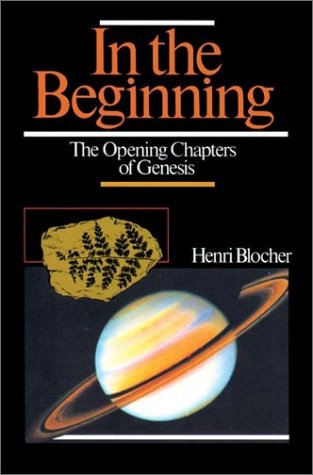 Henri Blocher is a Professor of Theology at Wheaton College. His book: In the Beginning: The Opening Chapters of Genesis is both helpful and informative. It is academic, yet accessible to those of us who aren’t specialists. Blocher does a masterful job of explaining not only the purpose of Genesis, but also deftly maneuvers the controversial difficulties that have arisen especially in the modern era as science has advanced.
Henri Blocher is a Professor of Theology at Wheaton College. His book: In the Beginning: The Opening Chapters of Genesis is both helpful and informative. It is academic, yet accessible to those of us who aren’t specialists. Blocher does a masterful job of explaining not only the purpose of Genesis, but also deftly maneuvers the controversial difficulties that have arisen especially in the modern era as science has advanced.
In Chapter 1, Blocher talks about the approach to Genesis. Dominating the discussion is the question of whether to approach Genesis literally or figuratively. Before reaching his conclusions, however, Blocher spends some time talking about the role of science in the interpretation of Scripture. Blocher presents the main approaches to this question: Concordism which seeks to rectify science with the Bible, “anti-scientism” which is Blocher’s view of creationism (the alternative to evolutionary theory), and fideism which seems to suppress the issue altogether. Blocher proposes a new way that allows science to “serve” our approach to studying Genesis, but not authoritatively. God’s Word is the authority and Blocher tries to take the positive advances of concordism, anti-scientism, and fideism and use those positives to help understand the book of Genesis. When he concludes the chapter talking about the literal or literary interpretation of Genesis 1, the reader can see that this is a unique story unlike any other story ever written.
Chapter 2 is a specific look at the week of Creation and it is Blocher’s view that the seven days are a literary device used to show the framework of God’s creating act. He writes, “The proofs we have given [in chapter 1] of the author’s careful structuring of his material would be enough to warn us not to suppose that the sevenfold shape is either imaginary or incidental.” (39) In this chapter, Blocher approaches four major interpretations of Genesis 1 in order of probability. Opponents may disagree, but the order in which Blocher organizes the probability of these theories begins with the reconstructionist theory as the least probable. This theory believes God reconstructed His creation after the fall of the devil. Next comes the concordist interpretation which is the idea that the days in Genesis 1 are ages or geological eras. Thirdly, Blocher deals with the literal interpretation that says the days are literal 24 hour days. Finally, Blocher believes the literary interpretation to be the best and he spends the rest of the chapter making the case for this interpretation.
Chapter 3 is about the content of Genesis 1. Rather than focusing on the framework and what that means, Blocher encourages the reader not to lose sight of the real purpose of Genesis. He suggests that if we get too caught up in science and creation then we may forget all that God is communicating to us. We can be distracted from the fact that God created ex nihilo, we can forget the work of all the members of the Trinity in the act of creation – including the Spirit, we can forget some of the characteristic nature of God (like He is a God of peace, not of disorder), etc. It is important to consider the purpose rather than just the conflict with modern science when we study Genesis.
Chapter 4 has to do with the Image of God and how humans are image bearers, unique among all the animals in their relationship with God. Blocher first makes sure we are sufficiently humble in our understanding of being “in the image of God”, in that we are “only an image.” “Mankind is infinitely lower than his Creator.” (82) With that humility as the backdrop, Blocher then turns to the privileged status we have over the rest of creation and talks about what it means to be made in the image of God.
In chapter 5, Blocher writes about the relationship between man and woman. The man and the woman are different sexually, with differing roles and yet they are connected. He treats “from the rib” as figurative language for their connectedness and relationship with one another Blocher supports this assertion when he says, “The Arabs apparently use the expression ‘He is my rib’ to mean ‘He is my close friend.'” (99) Blocher concludes the chapter by talking about the institution of marriage and that “the charter of marriage is summarized in Genesis 2:24” (108), that is, at least implicitly.
Chapter 6 focuses on covenant. Even though that word doesn’t exist in Genesis 2, Blocher believes it to be of primary importance for understanding that chapter. The outline of the covenant is found in the text according to Blocher. “Eden is the covenant gift.” (120) The two trees in the garden become “the chief provisions of the covenant agreement.” (121). “You shall surely die” is the penalty for breaking the covenant. This outline implies a covenant between God and Adam.
Chapters 7 and 8 deal with the breaking of the covenant and the penalty for Adam and Eve’s disobedience. Blocher suggests that at the heart of their disobedience was the desire to claim autonomy. This disobedience “overthrows the created order.” (154) As a result of breaking the provisions of the covenant agreement, Adam and Eve must die. However, they don’t “cease to be” as is our normal understanding of death. Instead, our understanding of death must “broaden and diversify”. It is not mere physical death but it is of a spiritual nature. Blocher writes, “As soon as the disobedience is committed, the beauty and harmony of existence is shattered, and in their place come shame, fear and pathetic excuses.” (173) Their death is a result of their “claim to be like God in their autonomy.” God curses the man, the woman, and the snake and sends them out of the harmonious existence of Eden (the covenant gift).
Finally, Blocher concludes in chapter 9 by talking about the nature of the aftermath of Adam and Eve’s expulsion from the garden of Eden. Much is written here about Adam and Eve’s son Cain who killed his brother Abel. “Sin proliferates along with mankind.” (197) but God is merciful and though it seems that only God’s justice is on display in the opening chapters of Genesis there is an element of grace. For one thing, Blocher writes that God kept Adam and Eve from eating from both trees because that would’ve been unthinkable. He hinders the completion of the Tower of Babel by confusing their language. This is to prevent the unthinkable from happening. Therefore, God’s justice is merciful. But ultimately, it is through the promise of the seed of the woman that we see the grace of God on full display.
Blocher concludes with a very helpful appendix on “Scientific Hypotheses and the beginning of Genesis”. Several scientific theories are given and this appendix helps to show that there is some harmony in science and the Bible. Taken together, every chapter of this book is both descriptive of events as found in the opening chapters of Genesis and relevant for many of today’s controversies surrounding those chapters. Blocher’s work is a commentary on Genesis that is helpful to the pastor, the theologian, and the general laity.
“On the Incarnation” by St. Athanasius
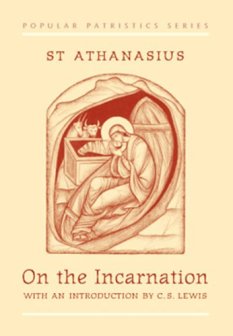 C. S. Lewis’ introduction to On the Incarnation by Athanasius might be the most important introduction to a book that I’ve ever read. Lewis first makes the case that reading old books are more important than reading new ones. If you can only have time to read an old book or a new one, he encourages the ordinary reader to read the old one. He reasons that, “A new book is still on its trial and the amateur is not in a position to judge it.” (4) He suggests that, if possible, you should read an old book for every new book that you read.
C. S. Lewis’ introduction to On the Incarnation by Athanasius might be the most important introduction to a book that I’ve ever read. Lewis first makes the case that reading old books are more important than reading new ones. If you can only have time to read an old book or a new one, he encourages the ordinary reader to read the old one. He reasons that, “A new book is still on its trial and the amateur is not in a position to judge it.” (4) He suggests that, if possible, you should read an old book for every new book that you read.
To better understand the emphasis Lewis places on old books, Lewis wrote, “People were no cleverer then than they are now; they made as many mistakes as we. But not the same mistakes. They will not flatter us in the errors we are already committing; and their own errors, being now open and palpable, will not endanger us.” (5) A steady diet of old and new books is helpful to keep us from being led astray.
After making the case that we should add old books to the new ones to balance our diet, Lewis goes on to introduce On the Incarnation. He comments on the masterful way in which St. Athanasius uses the classical Greek to communicate his ideas. He calls him a “master mind”. After such an introduction by such an important Christian thinker of the modern era, the reader is inspired to begin reading Athanasius.
In chapter 1, Athanasius finds it important to return to the story of the Creation and the Fall to discuss why the Incarnation was necessary. He writes, “It was our sorry case that caused the Word to come down.” Athanasius reasons that the Word became incarnate in order to bring about a recreation within humans precisely because it was the Word who created humans in the first place. In this first chapter Athanasius also writes about how we bear the Image of God within us, though he spends much more time on this later.
In chapters 2 and 3, Athanasius begins by writing a fascinating paragraph about the goodness of God. He writes about how God couldn’t simply back down from his promise that Adam and Eve would “surely die”, but neither could He just let humanity perish with no hope of redemption. Both options seem “monstrous and unfitting”. He then asks, “What, then, was God to do?” (32) His answer is to discuss how “the incorporeal, incorruptible, and immaterial Word of God entered our world.” This incarnation proves the goodness of God with which Athanasius began these two chapters. However, humanity still rejects the Incarnate Word of God. In fact, “So burdened were they with their wickedness that they seemed rather to be brute beasts than reasonable men, reflecting the very Likeness of the Word.” (40) At this point, Athanasius revisits the Image of God that was impressed on humanity from the beginning and “renew[ed] His Image in mankind.”
Chapter 4 talks about the death of Christ and of the importance of that event. Clearly, humans deserved death as Athanasius pointed out in chapter 1. He writes that it is in the death of Christ that God is proven to be good. He even takes great care in explaining why Jesus must die, why it must be a public death, why it must be a dishonorable death. Athanasius even uses the imagery of the cross that made it necessary for Jesus to stretch out His arms for us. He writes, “it was that He might draw His ancient people with the one and the Gentiles with the other, and join both together in Himself.” (55) This may not have been THE reason for Jesus’ outstretched arms on the cross but it illustrates an orthodox position and it is emblematic of the type of imagery of which Athanasius is capable in this book.
Athanasius begins chapter 5 which deals with the resurrection, by talking about the perfect timing of the resurrection. It wasn’t too short that people doubted whether or not Jesus really died, but it wasn’t too long that people would doubt whether it was in fact the same body. It is the resurrection that truly and fully proves the power of God and His power over death. That was the curse in the garden and that is the hope of our Savior, that death will be defeated in Him. He inspires us not to be afraid of death but even as young children we should train ourselves to die.
But obviously, not all believe in the Incarnation of God and wouldn’t understand the necessity of His death on a shameful cross and would scoff at the idea of a bodily resurrection of our Savior. It is for this reason that Athanasius turns to the unbelief and ridicule of both the Jews and the Gentiles in chapters 6, 7 and 8. Athanasius turns first to the Jews and declares that the evidence against the Jews unbelief lies “in the Scriptures which even themselves read.” (64) He uses 18 direct quotes from the Hebrew Bible and several other allusions to confirm that Jesus was in fact God as a refutation against the Jews unbelief. Then, Athanasius confronts the Gentiles. The Gentiles, to Athanasius are “utterly astonishing” in their disbelief because they seem to laugh at God and “yet fail to see the shame and ridiculousness of their own idols.” (75) Through a series of questions, Athanasius deconstructs the unbelief of the Gentiles: “What is there in our belief that is unfitting or ridiculous?” (76) When did the worship of idols become foolish and “spurned under foot”? Athanasius answers this with, “when the true Wisdom of God revealed Himself on earth.” (83) Truly, God Incarnate accomplished much while on earth and Athanasius enumerates many of the deeds of Jesus. He asks, what king or tyrant ever accomplished as much as Jesus did?
In his conclusion, Athanasius sums up the Incarnation and states his purpose to Macarius: “This will give you a beginning, and you must go on to prove its truth by the study of Scriptures.” (95) This is a good reminder to all the readers of this short work of the importance of the Incarnation of God to our lives.

 “I am glad George Tiller is dead.”
“I am glad George Tiller is dead.”
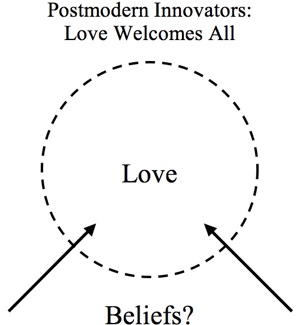












leave a comment